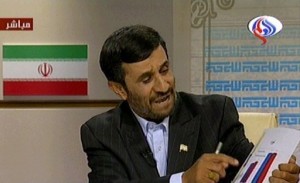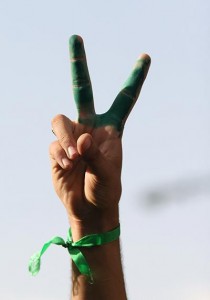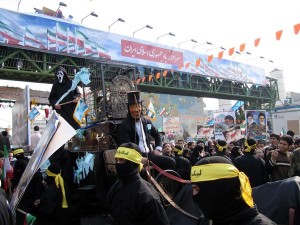Latest on Iran (18 February): Watching on Many Fronts
 Thursday, February 18, 2010 at 17:44
Thursday, February 18, 2010 at 17:44  2120 GMT: Author, translator and journalist Omid Mehregan has been released from detention.
2120 GMT: Author, translator and journalist Omid Mehregan has been released from detention.2100 GMT: So all our watching on many fronts is overtaken by the "Iran Might Be Getting A Bomb" story. Little coming out of Iran tonight; in contrast, every "Western" news outlet is screaming about the draft International Atomic Energy report on Iran's nuclear programme. (Funny how each, like CNN, is implying that it "obtained" an exclusive copy.)
1830 GMT: Political Prisoner News. "Green media" pull together reports that we carried last night: 50 detainees were released, including Shahabeddin Tabatabei, member of the Islamic Iran Participation Front and head of youth in support of Mir Hossein Mousavi and Mohammad Khatami, Parisa Kakaei of the Committee of Human Rights Reporters, student activist Maziar Samiee, and Khosrow Ghashghai of the Freedom Movement of Iran.
An activist adds that Ardavan Tarakameh was released on bail this evening.
NEW Iran Document: Today’s Mousavi-Karroubi Meeting (18 February)
NEW Iran Analysis: The "Now What" Moment (Farhi)
NEW Iran: Getting to the Point on Detentions & Human Rights (Sadr)
NEW Iran: Another Rethink on Green Opposition (Ansari)
Iran Analysis: Ahmadinejad Stumbles; “Karroubi Wave” Surges
Iran Nuke Shocker: Clinton/White House “Tehran Not Building Weapons”
Iran Document: Fatemeh Karroubi “My Family Will Continue to Stand for the People’s Rights”
The Latest from Iran (17 February): Psst, Want to See Something Important?
1745 GMT: Here We Go. Reuters proves our hypothesis within five minutes with "IAEA fears Iran may be working to make nuclear bomb":
The U.N. nuclear watchdog is concerned that Iran may now be working to develop a nuclear payload for a missile, the agency said in a confidential report on Thursday obtained by Reuters....
"The information available to the agency is extensive ... broadly consistent and credible in terms of the technical detail, the time frame in which the activities were conducted and the people and organizations involved," the report said.
"Altogether this raises concerns about the possible existence in Iran of past or current undisclosed activities related to the development of a nuclear payload for a missile."
1. The report can't be that confidential if Enduring America got a copy of it off the Internet earlier this afternoon.
2. There is nothing new in the passage cited by Reuters. The IAEA has said repeatedly that information "raised concerns" about a possible military nuclear weapons programme. That is different from saying that the information establishes that Iran is pursuing such a programme.
(1840 GMT: We might as well whistle in the wind. BBC and National Public Radio in the US are following the leader with "UN Nuke Agency Worried Iran May Be Working On Arms".)
Meanwhile, from the other side, Speaker of Parliament Ali Larijani has taken a swing at "Western pressure": "The Westerners say, 'You have a reactor in Tehran and its fuel should be supplied by us, and you should acquire fuel in the way we want, and give us your enriched uranium as well." And Deputy Speaker Mohammad Reza Bahonar has declared, "If they (Western countries) accept to swap (uranium) simultaneously in Tehran, we will stop the production of 20 percent fuel."
1740 GMT: On the Nuclear Front. Oh, well, you can pretty much put every internal story in Iran into cold storage for 48 hours --- the International Atomic Energy Agency has just released its latest report on Iran's nuclear programme. There's little, if anything, new in substance, but the IAEA's worried tone is likely to feed those who are pushing for tougher action against Tehran. And it most certainly will feed a media frenzy for the rest of the week.
We've posted the conclusion of the report as well as a snap analysis.
1600 GMT: Mousavi-Karroubi Meeting (see 1110 GMT). We have posted the English text of the statement from today's two-hour discussion.
1540 GMT: Confirmed. Norway has granted asylum to the Iranian diplomat, Mohammed Reza Heidari, who resigned his post in January .
1515 GMT: On the Nuclear Front. Worth watching --- the Turks are now reporting back to the US after Foreign Minister Ahmet Davutoglu's talks in Iran on Tuesday. A Turkish website writes that Davutoglu chatted by phone with Hillary Clinton on Wednesday night. Davutoglu will meet US Undersecretary of State William Burns today, and he told reporters, "Turkey's Prime Minister Recep Tayyip Erdogan will discuss this issue with U.S. President Barack Obama."
1420 GMT: Column of the Day. Roger Cohen of The New York Times asserts that, rather than slapping on further sanctions, US authorities should focus on assisting Iranians with access to and dissemination of information: "With the Islamic Republic weaker than at any time in its 31-year history, fractured by regime divisions and confronted by a Green movement it has tried to quash through force, U.S. sanctions are abetting the regime’s communications blackouts."
1315 GMT: What's Mahmoud Saying? Yet another installment in the tough-guy posturing between the US and Iran. From Press TV's website:
Iran's President Mahmoud Ahmadinejad has said the Zionist regime of Israel is so terrified of the Lebanese resistance and people. The Iranian president made the remark in a phone conversation with the Hezbollah Secretary General Seyyed Hassan Nasrallah, ISNA reported on Thursday.
President Ahmadinejad and Nasrallah also discussed the latest developments in Lebanon and the region. He further praised Nasrallah's latest stance on the Israeli threats. "The Zionists are really terrified of the resistance and people in Lebanon and the region," President Ahmadinejad emphasized. "But they (the Israelis) are looking for opportunities to make up for their past defeats in Gaza and Lebanon as they feel their credibility and existence are in jeopardy."
However, the president insisted, "They don't dare to do anything as they are afraid of the consequences."
[He] further underlined the need for maintaining readiness against any potential Israeli threats adding, "If the Zionist regime want to repeat the same mistakes they previously made, they must be gotten rid of once and for all, so that the region will be saved from their nuisance for ever."
1215 GMT: We've posted a second analysis today, this one from Farideh Farhi, of the "Now What?" moment for Iran after 22 Bahman.
1200 GMT: Purging Iran of Mousavi. Kayhan newspaper has called for the removal of Mir Hussain Mousavi’s name from a road and a College of Art in Khameneh, a city near Tabriz.
1150 GMT: Rafsanjani Watch (and Much More). Key MP Ali Motahhari has not only defended Hashemi Rafsanjani, he has used that defence to launch another attack on the President in an interview with the pro-Ahmadinejad newspaper Vatan-e-Emrooz.
Motahhari said that Ahmadinejad, during the Presidential campaign, had insulted Rafsajani and his family on television in front of an audience of 50 million. Rafsanjani, Motahhari continued, was not given even a few minutes to defend himself when he requested airtime.
Motahhari's conclusion? To gain support, Ahmadinejad is ready to destroy "revolutionary characters".
1110 GMT:The Facebook site supporting Mir Hossein Mousavi has a brief Persian-language report, "Mousavi and [Mehdi] Karroubi met with each other; soon we will talk to the people."
1035 GMT: Britain's Channel 4 is featuring a video interview with a former Basij member who claims he was jailed and abused for refusing to beat protesters.
1015 GMT: We've posted, as a response to those who dismiss "human rights" in the consideration of post-election Iran, a concise comment by lawyer and human rights activist Shadi Sadr.
0920 GMT: Economy Watch. The Islamic Republic News Agency has a budget deficit of 6 billion toman (just over $6 million).
0910 GMT: Habibollah Asgharowladi, a leading "conservative" member of Parliament and one of the proponents of last autumn's National Unity Plan, has declared in the pro-Larijani Khabar Online that some politicians "still have the illusion of having a majority", a likely reference to Mir Hossein Mousavi. Asgharowladi advises, "They should wake up."
Khabar, which is carrying out a two-front political campaign against both Ahmadinejad and the Mousavi/Green Movement, also features the comments of MP Esmail Kousari that "Greens are a gift from the USA". He denounces their attempt to rally and insists that the Revolutionary Guard and Basij military were not involved in security on 22 Bahman.
0900 GMT: Soroush "Hold A Referendum". In an interview with Rooz Online, leading Iranian intellectual Abdolkarim Soroush considers the Islamic Republic and "religious democracy", calling for a public referendum on the system of velayat-e-faqih (ultimate clerical authority).
0855 GMT: Karroubi Watch. Add another statement from the Karroubi family. Ali Karroubi's wife Nafiseh Panahi has told Deutsche Welle of the 22 Bahman attack on the Karroubi entourage with pepper spray: "The bodyguards remained mostly around [Mehdi Karroubi] and one of the colleagues noticed that the special guards had captured Ali and were taking him away. Had he not seen this, we would not have know that Ali had been arrested.”
Panahi said that she was told, wrongly, that Ali Karroubi had been taken to Evin Prison: "Honestly I felt better, because we know that Evin is more law-abiding than other detention centers. But when he was released and returned home last night and described his ordeal, we realized what kind of a place he had been kept in.” Panahi added:
After interrogations were over they had told him, to go and thank God that they had asked us to release you, because if you had stayed here over night we would have killed you. His eyes were closed until the last moment. Then they opened the door and throw him onto the street. A car suddenly stopped and took him home.
When Ali Karoubi arrived home, his pants were bloody, his head was cut open, and his hands were so injured that they had given him something to wrap them with. They beat him with a baton, fracturing his arm.
0845 GMT: Your Morning Mystery. In early January, Iran's armed forces loudly declared via state media that they were going to hold a large military exercise in early February to improve "defensive capabilities". Infantry, cavalry, telecommunication, and intelligence units of the Army would be carrying out drills in cooperation with some units of the Islamic Revolution Guards Corps.
Well, it's mid-February, and I must have missed the big show. Did it ever take place? Was the Iranian military merely blowing a bit of smoke (and, if so, wouldn't some folks in Iran have noticed the false declaration)? Or were the exercises planned, presumably at a great deal of expense, and then cancelled?
Any answers, especially, from the Iranian Armed Forces, welcomed.
0830 GMT: And A Very Big Diversion. I am not sure the Obama Administration thought through the results of this week's combination of Hillary Clinton's tough talk on Iran "dictatorship" and the visit of Admiral Mike Mullen, the Chairman of the Joint Chiefs of Staff, to Israel.
Here's one Washington may want to note. The Chief of Russia's Armed Forces General Staff, General Nikolai Makarov made his own grand declaration on Wednesday, warning that the US could strike Iran if it gets out of its current commitments in Iraq and Afghanistan.
That's an easy read: Russia reassures Iran, even as it is delaying the sale of S-300 missiles (partly in response to an appeal by Israeli Prime Minister Benjamin Netanyahu), that it is watching Tehran's back. And it warns the US Government to chill out a bit on the regional posturing.
[youtube]http://www.youtube.com/watch?v=BHaZzJE7C14[/youtube]
0820 GMT: Meanwhile, beware of distractions, notably those of "Nuclear Watch". Iranian state media throws up the latest diversion, quoting Turkish Parliament Speaker Mehmet Ali Sahin in a meeting with Iranian Education Minister Hamid-Reza Hajibabaie in Ankara: "Turkey will continue its support for the peaceful Iranian nuclear program. All the countries have the right to develop nuclear technology for peaceful purposes and Turkey has a clear policy regarding nuclear programs."
That's a cover for the more news-worthy but less convenient episode of Turkish Foreign Minister Ahmet Davugotlu's mission to Iran on Tuesday. With no break-through on a deal for uranium enrichment, it's the minor encounter (what role would an Education Minister have in Iran's nuclear programme?) that gets played up. Loudly.
0800 GMT: A busy Wednesday means that we now have several fronts to cover as the post-election conflict takes on new shapes in Iran.
There's "Economy Watch", which is an umbrella term to cover the renewed "conservative" challenge to President Ahmadinejad. For the moment, it appears that those who have been unsettled for months and who have been planning for weeks to push aside Ahmadinejad will focus on the President's budget and alleged economic mismanagement for their attacks. (There will be a significant exception in MP Ali Motahhari, who is now the point man to put wider demands, all the way to release of political prisoners.)
There's "Rafsanjani Watch". With the Government and its supporters still fearing that former President Hashemi Rafsanjani will "choose a side" and come out in direct opposition to Ahmadinejad, attacks on Rafsanjani have been stepped up in the last 48 hours. This front, for the moment, is likely to be more of a skirmish than an all-out battle: Rafsanjani will take cover in declared loyalty to the Supreme Leader. (Watch out, however, for the activities of Rafsanjani's children, notably his daughter Faezeh Hashemi. Yesterday they expressed open sympathy with the Karroubi family after the attack on Mehdi Karroubi's son Ali on 22 Bahman.)
And there's "Karroubi Watch". Count up the statements and letters to Ayatollah Khamenei in the last five days: Mehdi Karroubi, his wife Fatemeh, his son Hossein, even the mother-in-law of Ali Karroubi. No coincidence for me that a group, the "Sun Army", would try and silence the Karroubis by hacking the website Saham News, which is still rebuilding this morning.
None of this is to ignore the Green Movement as it considers its next moves. We have an analysis by Nazenin Ansari this morning.
 Abdolkarim Soroush,
Abdolkarim Soroush,  Ahmet Davutoglu,
Ahmet Davutoglu,  Ali Karroubi,
Ali Karroubi,  Ali Larijani,
Ali Larijani,  Ali Motahhari,
Ali Motahhari,  BBC,
BBC,  Barack Obama,
Barack Obama,  Benjamin Netanyahu,
Benjamin Netanyahu,  CNN,
CNN,  Channel 4 (Britain),
Channel 4 (Britain),  Committee of Human Rights Reporters,
Committee of Human Rights Reporters,  Esmail Kousari,
Esmail Kousari,  Faezeh Hashemi,
Faezeh Hashemi,  Farideh Farhi,
Farideh Farhi,  Fatemeh Karroubi,
Fatemeh Karroubi,  Habibollah Asgharowladi,
Habibollah Asgharowladi,  Hamid-Reza Hajibabaie,
Hamid-Reza Hajibabaie,  Hashemi Rafsanjani,
Hashemi Rafsanjani,  Hillary Clinton,
Hillary Clinton,  Hossein Karroubi,
Hossein Karroubi,  International Atomic Energy Agency,
International Atomic Energy Agency,  Iran,
Iran,  Iran Elections 2009,
Iran Elections 2009,  Iranian Students News Agency,
Iranian Students News Agency,  Islamic Republic News Agency,
Islamic Republic News Agency,  Israel,
Israel,  Kalemeh,
Kalemeh,  Kayhan,
Kayhan,  Khabar Online,
Khabar Online,  Khasrow Ghashghai,
Khasrow Ghashghai,  Khordaad 88,
Khordaad 88,  Lebanon,
Lebanon,  Mahmoud Ahmadinejad,
Mahmoud Ahmadinejad,  Maziar Samiee,
Maziar Samiee,  Mehdi Karroubi,
Mehdi Karroubi,  Mehmet Ali Sahin,
Mehmet Ali Sahin,  Mike Mullen,
Mike Mullen,  Mir Hossein Mousavi,
Mir Hossein Mousavi,  Mohammad Reza Bahonar,
Mohammad Reza Bahonar,  Mohammad Reza Heidari,
Mohammad Reza Heidari,  Mohammed Reza Heydari,
Mohammed Reza Heydari,  National Public Radio,
National Public Radio,  New York Times,
New York Times,  Nikolai Makarov,
Nikolai Makarov,  Omid Mehregan,
Omid Mehregan,  Parisa Kakaei,
Parisa Kakaei,  Press TV,
Press TV,  Recep Tayyip Erdogan,
Recep Tayyip Erdogan,  Reuters,
Reuters,  Roger Cohen,
Roger Cohen,  Rooz Online,
Rooz Online,  Russia,
Russia,  Saham News,
Saham News,  Shadi Sadr,
Shadi Sadr,  Shahabeddin Tabatabei,
Shahabeddin Tabatabei,  Sheikh Hassan Nasrallah,
Sheikh Hassan Nasrallah,  Sun Army,
Sun Army,  Turkey,
Turkey,  Vatan-e-Emrooz,
Vatan-e-Emrooz,  William Burns,
William Burns,  uranium enrichment in
uranium enrichment in  Middle East & Iran
Middle East & Iran 





